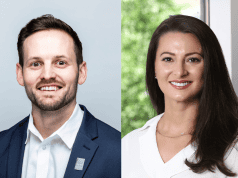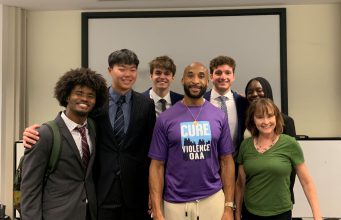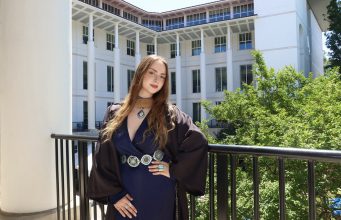The fields of private equity and real estate contain components of deal making that go beyond textbooks. From industry speakers to case competitions, Klaas Baks, associate professor in the practice of finance, and Roy Black, professor in the practice of finance, are committed to maintaining a presence in areas proven to spur business opportunities and market growth. During a recent session, the two discussed the strategic direction for their areas.
Q: Professor Black, you offer a number of excellent courses, but you’ve also provided students with experiential learning opportunities outside the classroom. What are you doing now, and what do you aspire to do in the future?
Black: Our specialty is real estate capital markets, so a lot of our students go into that area. We are located in one of the best real estate markets in the country, and we need to leverage that. There is an enormous classroom just west of us, and it stretches 16 miles up and down Peachtree Street. Students are good about taking advantage of it.
We bring in speakers for the BBA and MBA clubs’ Dinner and Learn series. Our adjunct professors are professionals who are currently working on high-profile real-estate cases. Who better to teach real estate development than them? We also have private equity funds that are run by a student board. The students are actually investing real money that is part of the Emory endowment.
Q: How is the board doing?
Black: Tremendously well. One investment made a 35.9% annual return. That’s not common, but it’s a huge success, nonetheless. Right now, we have about 20-25 students on the board, and that’s a perfect size. We have an active membership. Everybody knows each other, and that’s a good thing.
Q: Professor Baks, your courses also have a strong experiential component, as you welcome speakers like the billionaire Michael Lee-Chin and others to speak on investment issues. Why is this an important component for your courses?
Baks: Bringing in individuals who have success in the field of investing exposes students to the craft and process of thinking through an investing strategy in a different way. This augments the analysis-intensive coursework and expands the way students approach real-world problems.
Q: Research in the area of alternative investments continues to be a centerpiece of your work. What topics are you examining currently or are garnering media attention?
Baks: The field of alternative investments continues to evolve and encompass more business ventures. Topics of late include flipping houses and financing entrepreneurial ventures.
Q: This is such a vibrant city; how has the Atlanta business community
responded?
Black: Making contact in the business community gets us internships opportunities and job offers. The Career Management Center does a terrific job at placement, and our network ensures alumni have lifelong support. We receive internship offers from alumni, as well.
Baks: The growing number of new business ventures, especially startups and film ventures, makes Atlanta a prime location for observing the way alternative investments are tapped to seal deals of all kinds.—Nicole Golston











